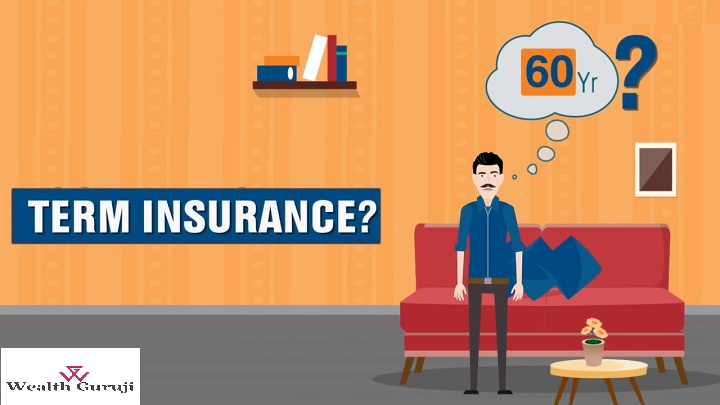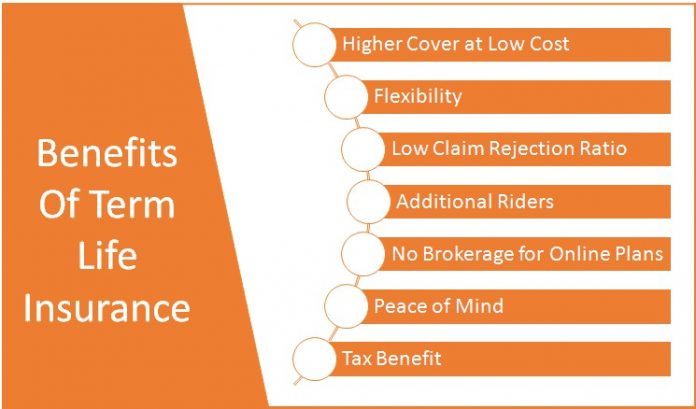Term Insurance- Benefits, Eligibility Criteria, Types-Part1

One of the best ways to ensure your family’s safety in your absence is buying a term insurance plan. A term insurance is a form of life insurance policy that provides coverage to the insured for a specific period of time which is the term of the policy.
If the insured expires during the tenure of the term insurance policy, the death benefit is paid to the nominee of the insured. Term insurance is comparatively less expensive, but it does not has a cash value. This means that the only value guaranteed under a term insurance policy is a death benefit which is paid to the nominee in case of death of the insured during the tenure of the policy.
How Does Term Insurance Work?
A term insurance is a promise made by the insurance company to pay your beneficiaries a set amount of money if you expire during the term of the insurance policy. However, the insured needs to pay a premium to the insurance company for the duration of the policy. In case you outlive the tenure of the term insurance policy you are not entitled to receive any amount.
Benefits of Term insurance Plan:

A term insurance plan has a lot of benefits which include the following:
- Simplicity:
It is easier to understand a term insurance plan compared to other insurance policies which are comparative complex and hence are difficult to understand. For having a term insurance all you need to do is pay the required premium and you are covered for your entire life.
- Competitive Pricing:
Since the structure of term insurance plans is simple it is easy to compare a term insurance plan with other insurance policies. A term insurance plan is simple and thus the buyer needs to have fewer information to buy the policy.
- Flexibility:
It is easier for an insured to opt out of the term insurance policy than to opt out from a cash value policy. In case of term insurance policy, if you stop paying the premium amount the life cover ceases. Also you can choose between buying a renewable and a non-renewable term insurance plan.
- Tax Benefits:
A term insurance plan offers benefit of tax exemption to the insured on the amount of premium paid under section 80C of the Income Tax Act 1961. The death benefit received by the beneficiaries is also exempted from tax under section 10 (10D) of Income Tax Act 1961.
- Lowest Premium:
The premium paid by the insured towards a term insurance plan is low when compared to the various other insurance policies.
Types of Term Insurance Policies:
All the term insurance plans in India can be categorized into six different types on the basis of their coverage and benefits. These categories are as follows:
- Level Term Plans:
The most simple and basic term insurance plan is the level term plan where the sum assured is fixed throughout the tenure of the policy and the benefits will be paid to the nominee on the event of death of the insured.
- TROP (Return of Premium) Plan:
It is a term insurance plan where the amount of premium paid by the insured will be returned in case the insured survives or outlives the tenure of the term insurance policy.
- Increasing Term Plans:
Under this term insurance plan, the insured has the option to increase the sum assured on an annual basis during the policy of the tenure, while keeping the amount of premium same during the tenure. As a result of this benefit, the premium charged for such insurance policy is usually higher.
- Decreasing Term Plans:
In case of a decreasing term insurance plan, the sum assured keeps on decreasing every year to meet the decreasing requirements of the life assured. The frequency of the decrease in the value of sum assured is chosen by the insured itself.
- Convertible Term Plan:
Under a convertible term insurance plan the policyholder has the option to convert the term plan to any other type of insurance policy. For instance, if you have bought a term insurance plan for 30 years and after 10 years you want to get it converted to an endowment policy, you can do that without any trouble.
- Term Plans with Riders:
These term plans come with riders like accidental death cover, critical illness cover, and other riders that can be purchased while you are buying a normal term insurance plan by paying a small amount of premium.
Documents required to buy a Term Insurance Plan
For buying a term insurance plan you require following documents:
- ID Proof: For an ID proof while buying a term insurance you can present any of the following driving license, Voter’s ID, Passport, PAN Card, Job Card issued by NREGA signed by an officer of the State Government, and Aadhaar Card.
- Proof of Residence:Utility bills, Bank Account Statement, Post office savings account statement, pension payment orders, Letter of allotment of accommodation any of these can be used as a proof of residence.
- Additional Documents: Additional documents required by the policyholder while buying a term insurance policy include proof of age, proof of income, and a photograph.
To Get Latest on Insurance click at Wealthguruji Insurance.


